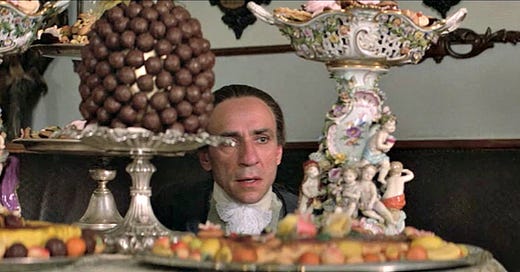Welcome back from The Oscars, ILTBTA readers! Were you one of the apparently many people who were confused or upset1 at Mozart’s Requiem being played during the In Memoriam segment? If so, boy do we have the post for you. Did you not understand the scuttlebutt because Lacrimosa is obviously relevant to commemorate the dead? Well, us neither, but you should still read on! Do you have no idea what we’re talking about because you didn’t watch The Oscars because our newsletter is the extent to which you care about those silly awards? We love and appreciate you, too. Remember to tell your friends about us.
Now hush, the music’s starting …

Previews
What, if anything, did we know about this coming attraction before we watched it?
Ellen: Technically, I have seen this before with my family, but I don’t remember a minute of it. Rock me Amadeus!
Tyler: I’m guessing it has to do with Mozart in some capacity?
Plots & Feelings
This one’s pretty self-explanatory.
Short Version (courtesy of IMDb): The life, success and troubles of Wolfgang Amadeus Mozart, as told by Antonio Salieri, the contemporaneous composer who was deeply jealous of Mozart's talent and claimed to have murdered him.
Long Version (modified from Wikipedia and formatted to fit your screen):
In 1823, aged composer Antonio Salieri attempts suicide2 and is committed to a psychiatric hospital. He claims that he murdered Wolfgang Amadeus Mozart. Father Vogler, a Catholic priest, encourages Salieri to confess his sins before God. After the young Vogler fails to recognize him, Salieri plays three old melodies to jog his memory. Vogler cannot recognize the first two (which Salieri wrote) but is relieved to recognize the third (Eine kleine Nachtmusik) at once. Salieri peevishly reveals that Mozart wrote it.
Ellen: I learned “Eine kleine Nachtmusik” in grade school music class, and part of the “lyrics” we were taught included “Mozart, he wrote it Mozart, he wrote it Mozart, he wrote it Mozart, he wrote it: wow!” So yeah, I knew that one too!
Ellen: This moment was, however, somewhat less effective for me because I assumed this crone was Mozart (no one had said his name yet), and that him saying he murdered Mozart was a fanciful description of his own suicide attempt. I probably also learned at some point that Mozart died young, but with everyone wearing these white wigs in their portraits, you just get it in your head they’re all old!
Tyler: I’m jumping ahead, but somewhat relatedly, I enjoyed Mozart experimenting with a few different wig styles and the movie for showing us his natural hair for a decent chunk.
Tyler: Also, shout out to the makeup team for Old Salieri because he looks realistically gnarly.

Salieri begins his confession by saying that he grew up hearing stories of the child prodigy, Mozart. As a youth, Salieri proposed that if God made Salieri a famous musician like Mozart, Salieri would give God his faithfulness, chastity, and diligence. Salieri's father soon dies, which he interprets as a sign that God has accepted his vow. By 1774, Salieri becomes court composer to Holy Roman Emperor Joseph II in Vienna. However, he has enough taste to know that Emperor Joseph has no ear for music (Salieri describes part of his job as “correcting the royal sight reading”) and that his own compositions will not stand the test of time.

When Salieri meets Mozart for the first time, he immediately knows that Mozart is the better composer but is shocked to learn that Mozart is obscene, immature, and dissolute3. And my goodness is his laugh off-putting! Adding to his dismay, he learns that Mozart never needs to pen a second draft of his music, implying divine inspiration. Salieri cannot fathom why God would choose a reprobate like Mozart as His earthly instrument. Salieri renounces God and vows to take revenge on Him by destroying Mozart. He achieves this at first by blocking Mozart from being appointed a royal music tutor and spreading rumors that make him unlikely to be hired, all while sharing sweets with the man, pretending to be his friend.
Ellen: One of Salieri’s only throughlines that is not to do with jealousy, God, music, or all three, is that he has a voracious sweet tooth. Maybe it’s supposed to be a stand-in for other vices in which he does not indulge, but seriously: look first for this man at the dessert table.
Tyler: I was too distracted by writing them down for NomNomNomz to do any actual deep thinking about his sweet tooth, but I think your analysis is spot-on.

Mozart's work is ahead of its time, and he has trouble finding work in Vienna, thanks in part to Salieri’s meddling. He spends himself into debt, alarming his wife Constanze. Salieri and Mozart bond over their shared contempt for Emperor Joseph's lack of taste, but for the same reason, Mozart is unimpressed by Salieri's populist work, which causes Salieri great pain.
Tyler: It was around this point where my “You Look Like This Other Celebrity” gift/curse kicked in and I was incapable of not seeing Ben Platt as Mozart given the stark resemblance between him and actor Tom Hulce.

Mozart boldly adapts the subversive play The Marriage of Figaro into a comedic opera. Salieri rejoices, thinking Mozart's career is ruined, but Mozart stuns Salieri by convincing the Emperor to approve the project. However, to Salieri's equal disbelief, the Emperor finds the opera boring, and it is promptly cancelled. In response to this and the death of his overbearing father, Mozart composes Don Giovanni, a dark, serious opera. Salieri is entranced, but vindictively gets that opera cancelled, too. Renouncing Vienna's artistic establishment, Mozart agrees to write The Magic Flute for a commoners' theater.
Ellen: This one bullet encompasses like 45 minutes worth of full scale opera productions that were shot in theaters in Vienna! Small wonder there was a separate credit for the opera set designer (Josef Svoboda).

After watching Don Giovanni five times, Salieri realizes that the dead commander who accuses Giovanni of sin represents Mozart's inferiority complex towards his own father. He concocts a plan to humiliate God. He persuades the unstable Mozart that his late father has risen to commission a Requiem Mass. He plans to kill Mozart, claim the Requiem as his own, and premiere it at Mozart's funeral, forcing God to listen as Salieri is acclaimed. Mozart overworks himself, juggling both The Magic Flute and the Requiem. Constanze, who wants him to focus on the Requiem, leaves with their son Karl to destress and decompress. Although The Magic Flute is a success, the dying Mozart collapses before he can finish the Requiem.
Ellen: Our introduction to the commoner’s theater is a parody of Don Giovanni, and while Constanze is mad they’re making fun of her husband’s composition’s, Mozart seems to enjoy himself! This raucous audience laughing and singing along helps drive home that this was the medium of the time. We think of opera as being high brow and serious, but in the absence of other options, it’s just as ripe for dumb, frothy pop culture.

Desperate to complete his plan, but also desperate for more of Mozart's heavenly music, Salieri begs the bedridden Mozart to keep writing the Requiem. He takes dictation from Mozart, during which he comes to terms with Mozart's superior talent. Mozart thanks Salieri for his friendship and Salieri admits that Mozart is the greatest composer he knows.
Ellen: In this scene, we finally get to see Mozart compose while Salieri takes his dictation, building up the absolutely metal “Confutatis” part by part. This scene and “too many notes” are some of the most iconic bits of the movie for me.
Tyler: That climactic scene where Salieri finally works with Mozart instead of plotting against him has a little bit for everyone, but particularly the music nerds! All that talk of C minor and … ya know … other music stuff.
Constanze returns and attempts to kick Salieri out of the apartment before he can steal the Requiem. As Salieri protests, they are both shocked to discover that Mozart has died from exhaustion. Due to his debts, Mozart is unceremoniously buried in a pauper's grave.
Ellen: The movie gives Constanze more credit than the Wikipedia summary does: she’s the only one who stands up for Mozart to his father, she does her best to keep their family together, and while she may not understand the genius of his work, she always insists others respect its worth.
Tyler: Often literally. Most of the time she’s basically his agent making sure that he gets paid.

Back in 1823, Vogler is too shaken to absolve Salieri, who surmises that God would rather destroy His beloved Mozart than allow Salieri to share in the smallest part of Mozart's glory. As Salieri is wheeled down a hallway, he proclaims himself the patron saint of mediocrities. He loudly absolves the asylum's other patients of their inadequacies as Mozart's laughter rings in the air.

Intermission
Even though ILTBTA is free, please indulge us further and enjoy this quick “advertisement.”
This installment of ILTBTA is brought to you by … Mozart’s Musical Tutoring Service!
Hey! Uh, hey you, heeheehee! Are you looking to learn music? Beyond that, are you looking to learn music from the greatest composer in all of Vienna? Oh good heavens, no, not Salieri, hahahaha. It’s me: Wolfgang Amadeus Mozart! When you hear music from the court composer, you’ll think it could be nothing but Salieri. When you hear my work, however, you’ll know it came directly from the Lord above! And don’t you want in on that slice of God’s love? It’s right there in my name, Amadeus! Teeheehee!

Mention “ILTBTA” when booking and receive your first lesson free, but after that, please pay Constanze directly, danke schön!
Wiki-Wiki-Whaaat?
Love a good Wikipedia rabbit hole in search of some fun facts? Us too.
Amadeus’ Wikipedia page has some interesting facts and anecdotes that we recommend you read through, but here are a few of our favorites:
Amadeus was based on the 1979 play of the same name, which was in turn inspired by Russian writer Alexander Pushkin’s 1830 play Mozart and Salieri. While there is some evidence of professional animosity between the two composers, scholars strongly disagreed with the artistic license taken by the play (and later film). Writer David Cairns called the play “myth-mongering.”
Ellen: Speaking of names, Mozart’s has its own Wikipedia article!
Tom Hulce was cast as Mozart by director Miloš Forman over such notable names as David Bowie, Mikhail Baryshnikov (whom we saw on screen in The Turning Point), Kenneth Branagh, and Mark Hamill, who played the part of Broadway. Branagh was dropped from consideration after Forman decided on an American cast, while the director opted against Hamill because he felt audiences could not separate him from the character of Luke Skywalker.
Ellen: Something that the podcast Unspooled pointed out is that the cast doesn’t have those “we’re doing a historical biopic so we’re all British for no reason” accents, which makes it feel less self-serious than it otherwise could have.
Tyler: I’ve criticized movies before for poor or non-existent accents, but this for some reason was not as distracting. Maybe because they were at least consistently all not doing accents.

Hulce used tennis player John McEnroe’s mood swings as inspiration for his portrayal of Mozart’s “unpredictable genius.” He reportedly did not figure out Mozart’s signature laugh until he drank a bottle of whiskey.

Hulce’s other notable (and wide-ranging) credits include “Pinto” Kroger in Animal House and Quasimodo in The Hunchback of Notre Dame, for which he provided the speaking and singing voice for the titular character. Fun tie-in to this year’s Oscars: Demi Moore provided the speaking voice of Esmeralda!
Actress Meg Tilly was originally cast as Mozart’s wife Constanze, but she tore a ligament in her leg playing soccer just one day before filming began and was later replaced by Elizabeth Berridge.
Mozart’s maid/Salieri’s spy Lorl was played by Cynthia Nixon, best known for playing Miranda on Sex and the City.
There is some disagreement amongst film critics over Amadeus’ Director’s Cut compared to what was originally shown in theatres. When Amadeus was released theatrically, it had a runtime of 161 minutes and was rated PG. However, since its release in 2002, the three-hour, R-rated Director’s Cut was the only widely available version. While some criticized the editing (or lack thereof) in the Director’s Cut, others lauded the additional dimension it gave certain characters. Two notable inclusions to the longer version are Constanze’s topless scene and the subplot about Mozart sleeping with a singer that Salieri was in love with. The former explains Constanze’s later hatred of Salieri, while the former emphasizes Salieri’s contempt for Mozart.
Tyler: While I feel like those two scenes/subplots added worthwhile context, I’m nevertheless curious about this shorter theatrical version. The Director’s Cut (the version the library had that we watched) was loooong.

Amadeus was nominated for eleven Academy Awards, winning eight: Best Picture, Best Director, Best Actor (F. Murray Abraham, who played Salieri and beat his co-star Hulce), Best Adapted Screenplay, Best Production Design, Best Costume Design, Best Makeup, and Best Sound. It is one of only five movies since 1982 that have won Best Picture without ever entering the weekend box office top five, along with future ILTBTA posts The English Patient, The Hurt Locker, and The Artist, plus previous post Birdman.
Tyler: I see this was back in the day when movies weren’t afraid of pitting their two leads against each other in the Best Actor/Actress category. Looking at you Wicked and Emilia Perez and your allegedly “supporting” actresses who were ostensibly the leads!
Oscar NomNomNomz
Since we all know a movie is nothing without the food and drink it incorporates.
It’s now time to award the Oscar for Best Snacktor in a Supporting Role4. And the nomnomnominees are:
“Nipples of Venus" from Salieri (Roman chestnuts in candied sugar)
“Crema Di Mascarpone Spezial” from Salieri (creamy mascarpone mousse)
Copious amounts of unknown booze from Mozart
And the Oscar goes to … the copious amounts of unknown booze! Unfortunately, Mozart drank it all while composing beautiful music (and what were we gonna do, STOP him?), so we will accept this award on its behalf.

Fill In The Blank
How did we really feel about The Academy nominating this?
Ellen: I’d like to share some sweet treats with The Academy! I think besides the “Confutatis” scene, one thing that really stuck in my childhood brain was Mozart’s pink wig when conducting, and that led me to believe this was going to be some rock ‘n’ roll fever dream version of Mozart’s life. Come to find out, that while it is the “cool” classical music biopic, complete with fart jokes and party games, it’s more staid than, say, Baz Luhrmann’s Elvis. And thankfully, it’s much better than that as well. Despite the wigs, these all feel like real, relatable people, not untouchable figures of the past. While Salieri’s fanatical confession and obsession can be a bit much, it’s also a wonderful storytelling device that allows for an ongoing analysis of Mozart’s music, which most people cannot articulate, even if they can just feel in their bones that it’s exceptional.5 The Director’s Cut dragged a bit, but I also have to appreciate the commitment to full scale opera productions, and even to an opera production mocking the production from a few scenes earlier. The haters will say it’s “too many notes,” but real ones can see the genius!
Tyler: I’d like to pay The Academy a tidy sum to create sweet music for me, but then harangue them to do it faster. The Director’s Cut we inadvertently watched6 had a bit too much opera for me personally, but I somehow also found Amadeus to be deeply watchable? Like ten minutes into a performance I’d start looking at my phone and kind of just let the music wash over me while I half paid attention, but then it’d change scenes and I was sucked right back in. (This must be what people thought Maestro would be, a capital-f Film about a tortured musical genius that pulls back the curtain on the sausage getting made as opposed to the genius’ relationships).
Much like the 2023 Dungeons and Dragons movie we saw (stick with me), I appreciated the thematically appropriate yet accessible Easter eggs and references that even I picked up on, knowing full well that there were probably many many more that classical music lovers were drooling over. I also enjoyed the instances where Salieri or Mozart would give live commentary aloud while the music played in their head audibly for the viewers, giving you insight into how they saw music and a glimpse into the aforementioned sausage-making.
Overall, the director made some absolute choices that I didn’t always agree with (e.g., Mozart’s whole character and vibe, Salieri’s crisis of faith being central to his character despite his unwillingness to let the priest get a word in to push him on that, the length, etc.), but at the end of the day the music (hard to mess that one up), acting, set pieces, and story all overcame and somehow complemented those choices to make it greater than the sum of its parts.
Let The Credits Roll
Thanks for reading! Some quick housekeeping as you exit the theatre:
If you have plots and feelings of your own (on the movie or ILTBTA in general), feel free to comment on the post or simply reply to the email. If you liked reading this: tell your friends! If you hated reading this: tell your friends how much you hated it by forwarding it to them!
ILTBTA is on Letterboxd, the social networking/movie review site for movie fans. Follow us there to read our Spreadsheet comments of our ILTBTA movies, plus our ratings of other movies we watch!
If you’d like to start a wild Best Picture journey of your own, feel free to download a copy of The Spreadsheet. Bonus: checking off the boxes is oddly satisfying.
Post-Credits Scene
Get a sneak peek at the next ILTBTA installment.
In honor of Anora’s Best Picture win, we’re going to be watching a different screwball comedy: 1931’s The Front Page! Starring Pat O’Brien and Adolphe Menju as an investigative reporter and his editor, The Front Page follows the story of a wrongfully (?) accused murderer and a star writer turning in One Last Story. The Front Page is available for free on Plex (a thing that exists, apparently) and YouTube (don’t tell them we told you).
Until then, enjoy some Mozart!

The first time anyone has been either on the internet, we assume.
Tyler: At what point did movies start to invest in better fake blood? Because it was clearly after this movie.
Sounds like my ex-wife!
Results tabulated and certified by the accountants at Ernst & Yum™.
Tyler: Hey that’s me!
Ellen: Though in our defense, the director’s cut appears to be the only game in town these days!




